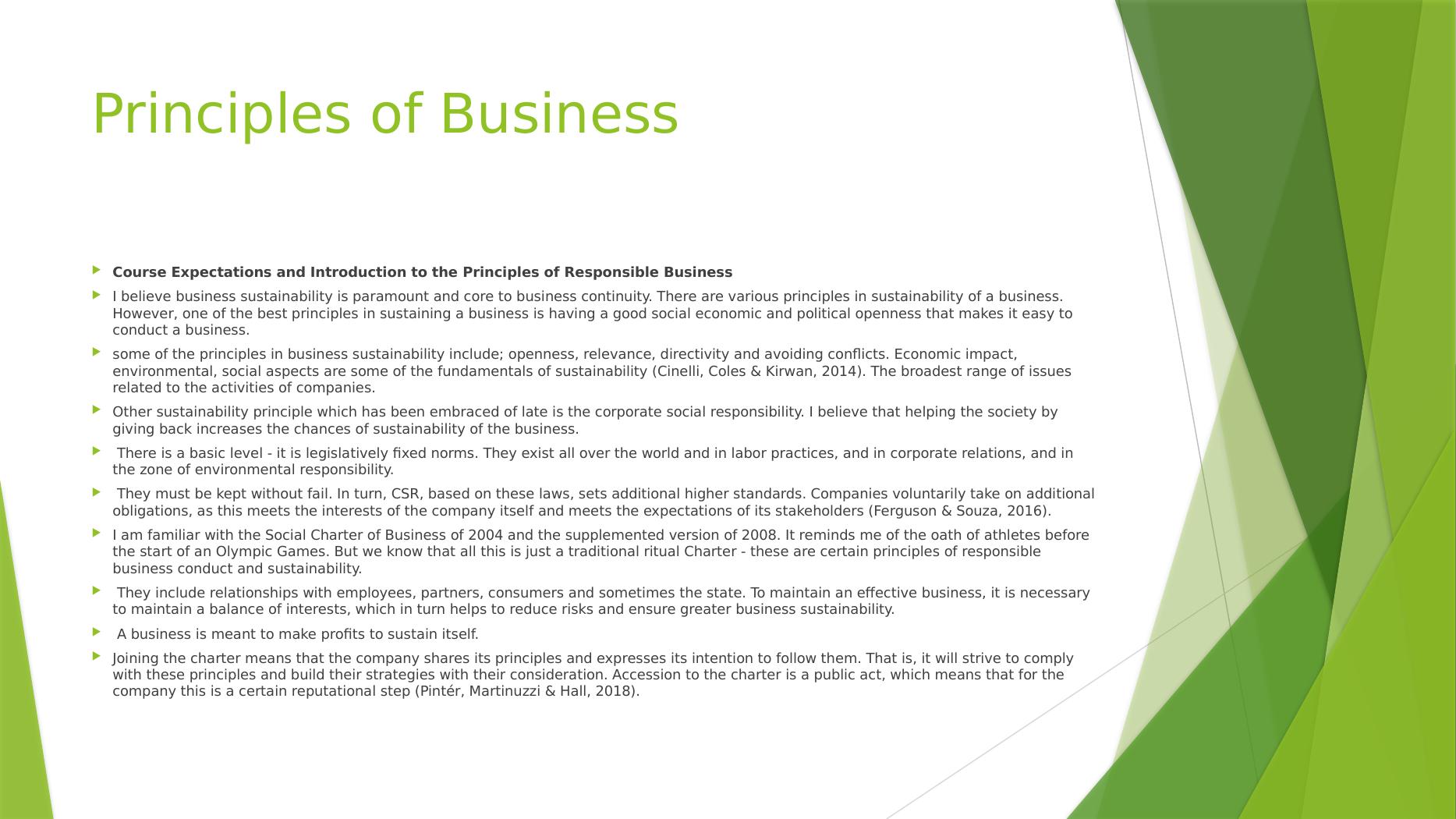Sustainability in Business: Principles, Concepts, and Case Studies
Added on 2023-06-08
6 Pages2000 Words241 Views
Sustainability

Principles of Business
Course Expectations and Introduction to the Principles of Responsible Business
I believe business sustainability is paramount and core to business continuity. There are various principles in sustainability of a
business. However, one of the best principles in sustaining a business is having a good social economic and political openness that
makes it easy to conduct a business.
some of the principles in business sustainability include; openness, relevance, directivity and avoiding conflicts. Economic impact,
environmental, social aspects are some of the fundamentals of sustainability (Cinelli, Coles & Kirwan, 2014). The broadest range of
issues related to the activities of companies.
Other sustainability principle which has been embraced of late is the corporate social responsibility. I believe that helping the society
by giving back increases the chances of sustainability of the business.
There is a basic level - it is legislatively fixed norms. They exist all over the world and in labor practices, and in corporate relations,
and in the zone of environmental responsibility.
They must be kept without fail. In turn, CSR, based on these laws, sets additional higher standards. Companies voluntarily take on
additional obligations, as this meets the interests of the company itself and meets the expectations of its stakeholders (Ferguson &
Souza, 2016).
I am familiar with the Social Charter of Business of 2004 and the supplemented version of 2008. It reminds me of the oath of
athletes before the start of an Olympic Games. But we know that all this is just a traditional ritual Charter - these are certain
principles of responsible business conduct and sustainability.
They include relationships with employees, partners, consumers and sometimes the state. To maintain an effective business, it is
necessary to maintain a balance of interests, which in turn helps to reduce risks and ensure greater business sustainability.
A business is meant to make profits to sustain itself.
Joining the charter means that the company shares its principles and expresses its intention to follow them. That is, it will strive to
comply with these principles and build their strategies with their consideration. Accession to the charter is a public act, which means
that for the company this is a certain reputational step (Pintér, Martinuzzi & Hall, 2018).
Course Expectations and Introduction to the Principles of Responsible Business
I believe business sustainability is paramount and core to business continuity. There are various principles in sustainability of a
business. However, one of the best principles in sustaining a business is having a good social economic and political openness that
makes it easy to conduct a business.
some of the principles in business sustainability include; openness, relevance, directivity and avoiding conflicts. Economic impact,
environmental, social aspects are some of the fundamentals of sustainability (Cinelli, Coles & Kirwan, 2014). The broadest range of
issues related to the activities of companies.
Other sustainability principle which has been embraced of late is the corporate social responsibility. I believe that helping the society
by giving back increases the chances of sustainability of the business.
There is a basic level - it is legislatively fixed norms. They exist all over the world and in labor practices, and in corporate relations,
and in the zone of environmental responsibility.
They must be kept without fail. In turn, CSR, based on these laws, sets additional higher standards. Companies voluntarily take on
additional obligations, as this meets the interests of the company itself and meets the expectations of its stakeholders (Ferguson &
Souza, 2016).
I am familiar with the Social Charter of Business of 2004 and the supplemented version of 2008. It reminds me of the oath of
athletes before the start of an Olympic Games. But we know that all this is just a traditional ritual Charter - these are certain
principles of responsible business conduct and sustainability.
They include relationships with employees, partners, consumers and sometimes the state. To maintain an effective business, it is
necessary to maintain a balance of interests, which in turn helps to reduce risks and ensure greater business sustainability.
A business is meant to make profits to sustain itself.
Joining the charter means that the company shares its principles and expresses its intention to follow them. That is, it will strive to
comply with these principles and build their strategies with their consideration. Accession to the charter is a public act, which means
that for the company this is a certain reputational step (Pintér, Martinuzzi & Hall, 2018).

Ecological Sustainability
Sustainability and Sustainable Development Ecological Footprints
The idea of sustainability is only theoretical to many of us. However, sustainability affects us in our daily lifestyles in the sustainability of
the ecological footprints on the globe.
It is acting responsibly with the resources that the ecology accords to us and the progress towards the sustainability of the future. The
choices that we make in our daily lives greatly affect the environment. We should sustain it. Non-observance of the principles of the
charter does not imply any punitive sanctions, but the company's reputation can be affected.
In addition, it should be borne in mind that the principles of responsible business conduct lie at the heart of effective strategies and good
management quality, which means that they correspond to the interests of the medium- to long-term companies themselves, and not just
the immediate result (Sala, Ciuffo & Nijkamp, 2015).
Generally we can reduce the negative effect of impact in destruction of the ecosystem by reducing pollution and reducing our consumption
of resources.
The implementation of the provisions of the charter is a purely voluntary matter, at the same time meeting the interests of companies,
and, undoubtedly, influencing their reputation. It is useful to remember that reputation, no matter how good or bad, always goes ahead of
us.
This involves both risks and opportunities. In the modern world it is impossible to work in a closed mode.
It is important to inform stakeholders how much you are doing your business, what your strategy is, how you achieve the implementation
of this strategy, what your results are, how it affects society and the environment.
It is clear that these impacts can be either positive or not. In this case, it is important how you control the negative impacts, how to reduce
the level of undesirable consequences (Santoyo & Azapagic, 2014).
Today, the requirements of information openness are one of the main conditions for the company's competitiveness. Be open or you will be
preferred to someone else whose activities are more transparent, who is more understandable and predictable. These trends are increasing
all over the world, for companies this is also relevant. Such is the soft power of coercion.
In order to more objectively evaluate the performance of companies, the board has for several years now compiled indices of corporate
sustainability, responsibility and openness on a whole set of criteria and indicators.
Sustainability and Sustainable Development Ecological Footprints
The idea of sustainability is only theoretical to many of us. However, sustainability affects us in our daily lifestyles in the sustainability of
the ecological footprints on the globe.
It is acting responsibly with the resources that the ecology accords to us and the progress towards the sustainability of the future. The
choices that we make in our daily lives greatly affect the environment. We should sustain it. Non-observance of the principles of the
charter does not imply any punitive sanctions, but the company's reputation can be affected.
In addition, it should be borne in mind that the principles of responsible business conduct lie at the heart of effective strategies and good
management quality, which means that they correspond to the interests of the medium- to long-term companies themselves, and not just
the immediate result (Sala, Ciuffo & Nijkamp, 2015).
Generally we can reduce the negative effect of impact in destruction of the ecosystem by reducing pollution and reducing our consumption
of resources.
The implementation of the provisions of the charter is a purely voluntary matter, at the same time meeting the interests of companies,
and, undoubtedly, influencing their reputation. It is useful to remember that reputation, no matter how good or bad, always goes ahead of
us.
This involves both risks and opportunities. In the modern world it is impossible to work in a closed mode.
It is important to inform stakeholders how much you are doing your business, what your strategy is, how you achieve the implementation
of this strategy, what your results are, how it affects society and the environment.
It is clear that these impacts can be either positive or not. In this case, it is important how you control the negative impacts, how to reduce
the level of undesirable consequences (Santoyo & Azapagic, 2014).
Today, the requirements of information openness are one of the main conditions for the company's competitiveness. Be open or you will be
preferred to someone else whose activities are more transparent, who is more understandable and predictable. These trends are increasing
all over the world, for companies this is also relevant. Such is the soft power of coercion.
In order to more objectively evaluate the performance of companies, the board has for several years now compiled indices of corporate
sustainability, responsibility and openness on a whole set of criteria and indicators.

End of preview
Want to access all the pages? Upload your documents or become a member.
Related Documents
Sustainability in Business: Principles, Concepts, and Case Studieslg...
|8
|1869
|484
BUGEN 3711 Applied Principles for Responsible Business Practiceslg...
|19
|4481
|84
Sustainable Business: Importance of Sustainable Development in Contemporary Timeslg...
|6
|1338
|337
National Australia Bank Code of Conductlg...
|12
|2538
|60
Sustainability and Corporate Social Responsibility PDFlg...
|12
|3700
|70
Sustainable Enterprise and Social Responsibilitylg...
|12
|3700
|92
